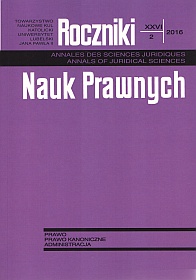Is Second Judgement in the Marriage Annulment Procedure Necessary?
Abstract
In order to give answer to the question presented in the title, first of all we need to be aware that in the present world the Church Courts encounter with common divorce mentality that not only does not understand, but also does not accept the attribute of dissolubility and the sacramental character of marriage. To the signalled situation in which the Church Courts operate at present, one must also add a very common moral relativism and the relativism that concerns free and selective interpretation of the legal norm that follows it and regrettably also takes hold on church environments.
The new legislature of Pope Francis on proceedings concerning adjudication of annulment of marriage gave a clear response on the subject of the necessity of the second judgement. It must also be added that in the previous legal doctrine of the Church, there exist “pros” and “cons” concerning the second unanimous positive adjudication. The above statements are of a historic character, nowadays. However, for the development of doctrine and legal norms they will remain an important reference point. Certainly, they can also be used to better understand the reform of the marriage annulment procedure carried out by Pope Francis.
Abolishment of the obligation of the second judgement and permission to establish One Man Tribunals will, without any doubt, not only “increase” the pace of marriage annulment proceedings, but also will “simplify” it. Thus, first and foremost here arise questions if this will not result in perversion of the Church judicature and, most of all, if it will properly protect the attribute of dissolubility of marriage. All the more, that since Pope Benedict XIV who is called “the great canonist”, through the Code of Canon Law, 1917 and 1983, together with the proceedings instruction Dignitas Connubii of 2005, we have had clearly defined norms that the second positive adjudication is necessary to be allowed to get married in the Church for a second time.
References
Adamowicz Leszek, Jedna czy dwie instancje? – w oczekiwaniu na reformę procesu małżeńskiego, [w:] Grzegorz Leszczyński (red.), Procesy i procedury: nowe wyzwania, Wydawnictwo Uniwersytetu Kardynała Stefana Wyszyńskiego, Warszawa 2015, s. 67-79.
Bączkowicz Franciszek, Prawo kanoniczne, Wydawnictwo Diecezjalne św. Krzyża w Opolu, Kraków 1958.
Bonnet Piero A., Il principio della duplice decisione giudiziaria conforme ed il suo fondamento, [w:] Piero A. Bonnet (red.), La doppia conforme nel processo matrimoniale. Problemi e Prospettive, Libreria Editrice Vaticana, Città del Vaticano 2003, s. 71-104.
De Paolis Velasio, Amministrazione della giustizia e situazione dei tribunali ecclesiastici, „Revista española de derecho canónico” 64 (2007), s. 339-377.
Fantappiè Carlo, La duplice sentenza conforme: biografia di una norma nel quadro della legislazione matrimoniale, [w:] Piero A. Bonnet (red.), La doppia conforme nel processo matrimoniale. Problemi e Prospettive, Libreria Editrice Vaticana, Città del Vaticano 2003, s. 19-55.
Llobell Joaquín, Novità procedurali riguardanti la Rota Romana: le facoltà speciali, Stato, Chiese e pluralismo confessionale, „Rivista telematica” (www.statoechiese.it), n. 32/2013, 21 ottobre 2013, s. 13 [dostęp: 3.04.2014].
Llobell Joaquín, Verità del consenso e nullità del matrimonio: il processo dichiarativo di nullità, [w:] Hector Franceschi (red.), Matrimonio e famiglia. La questione antropologica, EDUSC, Roma 2015, s. 245-260.
Lüdicke Klaus, Jenkins Ronny E., Dignitas Connubii: Norms and Commentary, Canon Law Society of America, Alexandria 2006.
Malecha Paweł, Lex propria Najwyższego Trybunału Sygnatury Apostolskiej, [w:] Józef Wroceński, Jan Krajczyński (red.), Finis legis Christus, t. I, Wydawnictwo Uniwersytetu Kardynała Stefana Wyszyńskiego, Warszawa 2009, s. 565-585.
Orłowska Zofia, Sądowa ochrona nierozerwalności małżeństwa w alokucjach Jana Pawła II do Trybunału Roty Rzymskiej, mps, Kraków 2015.
Ortiz Miguel A., Fede e consenso matrimoniale, [w:] Hector Franceschi (red.), Matrimonio e famiglia. La questione antropologica, EDUSC, Roma 2015, s. 115-142.
Pompedda Mario F., Verità e giustizia nella doppia sentenza conforme, [w:] Piero A. Bonnet (red.), La doppia conforme nel processo matrimoniale. Problemi e Prospettive, Libreria Editrice Vaticana, Città del Vaticano 2003, s. 7-18.
Rozkrut Tomasz, Jak interpretować normy kodeksowe? Prawo kanoniczne wyrazem jedności Kościoła, „Tarnowskie Studia Teologiczne” 31 (2012), nr 2, s. 115-130.
Rozkrut Tomasz, Jan Paweł II do Roty Rzymskiej, Biblos, Tarnów 2003.
Rozkrut Tomasz, Nowe kompetencje Trybunału Roty Rzymskiej, [w:] Tomasz Rozkurt (red.), VI Ogólnopolskie Forum Sądowe: „Wybrane zagadnienia procesu małżeńskiego w XXX-lecie Kodeksu Jana Pawła II. Materiały z ogólnopolskiego spotkania pracowników sądownictwa kościelnego w Gródku nad Dunajcem w dniach 10-11 czerwca 2013 roku, Biblos, Tarnów 2014, s. 161-166.
Rozkrut Tomasz, Odpowiedzialność biskupa diecezjalnego, metropolity oraz konferencji biskupów za współczesny proces małżeński (spostrzeżenia na marginesie m.p. „Mitis Iudex Dominus Iesus” papieża Franciszka z 15 sierpnia 2015 r.), [w:] Jan Krajczyński, Proces małżeński według motu proprio Mitis Iudex Dominus Iesus, Płocki Instytut Wydawniczy, Płock 2015, s. 37-52.
Rozkrut Tomasz, Pewność moralna niezmiennym uwarunkowaniem pozytywnego wyrokowania, [w:] Grzegorz Leszczyński (red.), Procesy i procedury: nowe wyzwania, Wydawnictwo Uniwersytetu Kardynała Stefana Wyszyńskiego, Warszawa 2015, s. 49-66.
Rozkrut Tomasz, Recepcja instrukcji procesowej Dignitas connubii w Polsce, „Annales Canonici” 11 (2015), s. 177-193.
Rozkrut Tomasz, Synod Biskupów w Kościele posoborowym, Biblos, Tarnów 2010.
Copyright (c) 2016 Roczniki Nauk Prawnych

This work is licensed under a Creative Commons Attribution-NonCommercial-NoDerivatives 4.0 International License.


